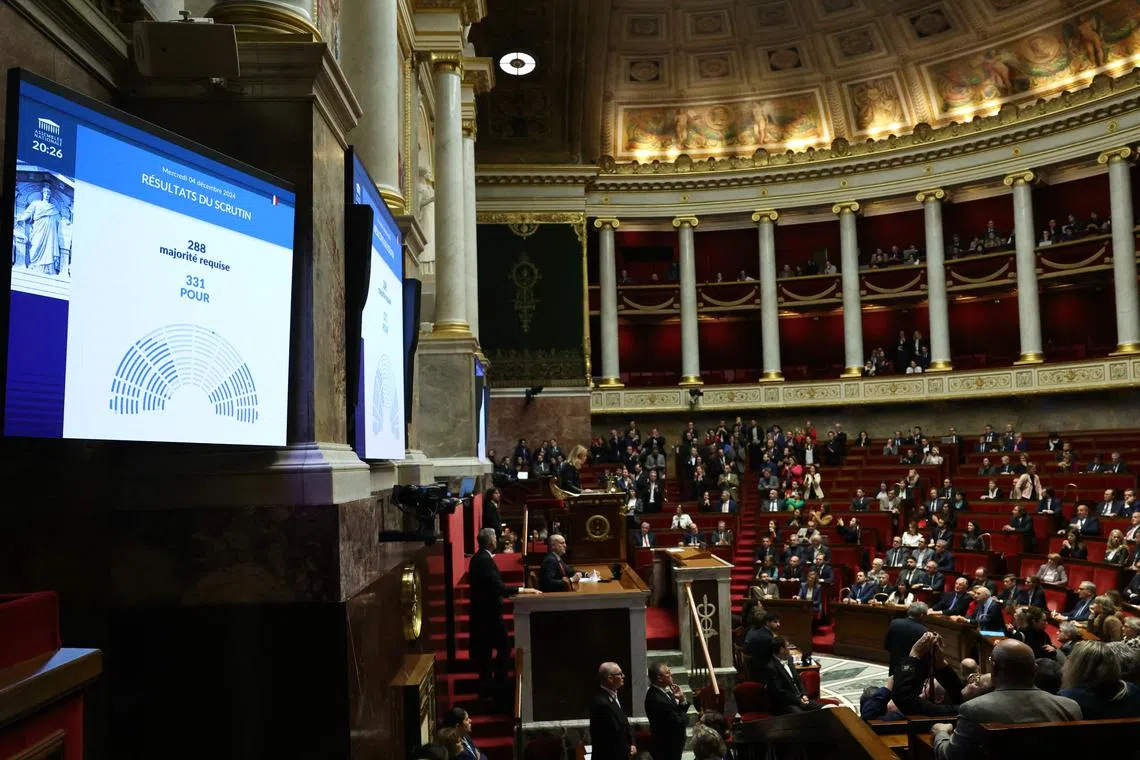Collapse of France’s government further burdens its weak economy
Sign up now: Get ST's newsletters delivered to your inbox

The French Parliament on Dec 4 backed a vote of no-confidence in Prime Minister Michel Barnier, ousting him and his Cabinet.
PHOTO: AFP
PARIS – As France prepared for deepening political turmoil after a parliamentary vote on Dec 4
Business leaders, who had been grappling with uncertainty for months, say they are bracing for a hit to growth. Unions warn of widening layoffs. Thousands of civil servants, including teachers, hospital staff, airport employees and workers in the gas and electricity sectors, are planning street protests across the country for Dec 5.
France’s economy was already in a rough patch when a deeply divided Parliament backed a vote of no-confidence in Prime Minister Michel Barnier, ousting him and his Cabinet and leaving the country without a functioning government or a budget for 2025 to rein in France’s troubled finances.
Mr Barnier is likely to remain as a caretaker until President Emmanuel Macron appoints a new prime minister, and France will use the 2024 budget until a new one can be assembled. In the meantime, the government’s collapse “will make everything more serious and more difficult” for France, Mr Barnier said in a speech to Parliament before the vote.
“At a time when economic growth in France is slowing markedly, this is bad news,” said Ms Charlotte de Montpellier, chief economist for France at ING bank.
High energy costs and interest rates, a downturn in domestic industry, falling consumer confidence and a slowdown in business investment have left growth largely flat in France for the past two years. Political instability since Mr Macron dissolved Parliament in the summer and held snap elections that led to a more deeply fractured legislature caused businesses to further pause investment and hiring.
The schism on Dec 4 risks ushering in “a new period of instability”, said the Confederation of Small and Medium Enterprises, which represents the bulk of French businesses that make up the backbone of activity.
“A France without a budget would open the door to a debt crisis, the consequences of which would hit economic players hard,” the group said.
The turmoil heralds a sombre chapter for France, a cornerstone of Europe’s euro currency union. France has long been an engine of growth alongside Germany, but both countries have been steadily weakened since 2021 by Europe’s energy crisis and high interest rates, turning them from leaders of the bloc into laggards.
But in recent months, fiscal troubles have piled on France’s problems. The country has been grappling with a ballooning debt and deficit, the result of unbridled government spending by Mr Macron since Covid-19 pandemic lockdowns. That has fuelled concerns about the country’s creditworthiness by investors who have pushed France’s borrowing costs above those of crisis-scarred Greece.
The problems have started to nudge up unemployment, ending a brief but intense spree of job creation that was largely supported by public spending. The jobless rate, which fell to a 15-year low of 7.1 per cent in 2024, rose to 7.4 per cent in the autumn.
France’s Industry Minister Marc Ferracci said thousands of additional job cuts are likely in the coming months.
The challenges have only grown as the state of France’s overstretched finances has become apparent. With a deficit that has jumped to 6.1 per cent of economic output, from 5.5 per cent in 2024, the country is now in worse fiscal straits than Greece, Spain and Italy. The country’s debt has exploded to more than €3.2 trillion (S$4.5 trillion), or more than 112 per cent of the country’s gross domestic product.
The deficit had already started to widen during Mr Macron’s first presidential term, after the yellow vest popular uprising in 2018 over a proposed petrol tax increase set off nationwide protests by people struggling to make ends meet. Mr Macron unleashed billions in subsidies and stimulus to quell the social maelstrom.
Two years later, Covid-19 hit. Mr Macron, vowing to do “whatever it takes” to support the French economy, deployed hundreds of billions in spending to help companies furlough workers at 80 per cent of their pay, effectively nationalising a portion of private payrolls to prevent mass unemployment. The government also provided billions in cheap state-backed loans for companies.
Just as the economy appeared to be recovering, Russia’s invasion of Ukraine in 2022 sent energy prices soaring. Mr Macron authorised another round of major government spending to shield households and businesses.
“Growth was financed through public spending,” Ms de Montpellier said. But the sustainability of the relief was not addressed, she added. “People knew that it was not going to last forever; now it’s actually the case.” NYTIMES


